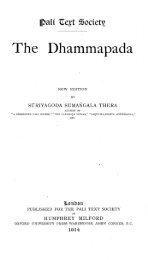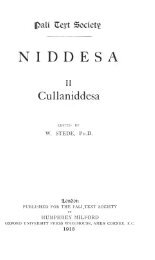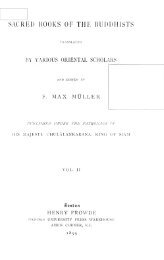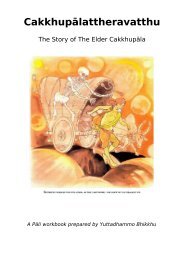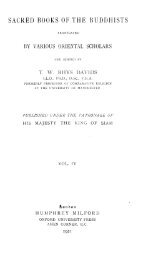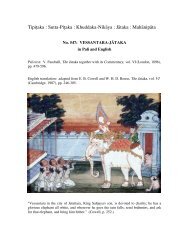Lessons In Practical Buddhism - Sirimangalo.Org
Lessons In Practical Buddhism - Sirimangalo.Org
Lessons In Practical Buddhism - Sirimangalo.Org
Create successful ePaper yourself
Turn your PDF publications into a flip-book with our unique Google optimized e-Paper software.
to rest, settling into the moment as a way of calming the<br />
mind. Though calming the mind is a valid meditation<br />
practice, even such calm requires development to achieve.<br />
If one doesn’t direct the mind towards purely tranquil states,<br />
unwholesomeness will quickly overpower the meditator’s<br />
mind, rendering the meditation practice worse than useless.<br />
<strong>In</strong> order to gain true and lasting fruit from the practice, a<br />
great amount of work is required. We shouldn’t undertake<br />
meditation with a complacent attitude, thinking that we can<br />
just sit, letting our minds float around, and expect to gain<br />
real benefit. If you actually put effort into the practice, you<br />
will find that your mind is far more clear, your insight more<br />
powerful, and your concentration more stable than simply<br />
sitting and waiting for results to come. It is similar to<br />
working out the body; when you put out effort, pushing the<br />
limits of your present capabilities, whether the object be<br />
body or mind, it will become more and more powerful in<br />
proportion to the amount of effort put out.<br />
Also, as with physical exercise, it is the effort itself, rather<br />
than the result, that is important in meditation practice.<br />
When one lift weights, one isn’t interested in the movement<br />
of the weights but rather the work itself. The weights return<br />
to their original position; the result is simply increased<br />
physical strength. Likewise, in meditation, walking back and<br />
forth and sitting still, watching the stomach rise and fall<br />
again and again, may cause people to think: “Well, that’s<br />
stupid! You’re not going to get anywhere just pacing back<br />
and forth or watching your stomach for hours on end.” Yet,<br />
as with lifting weights, at the end of the exercise you have<br />
indeed gained something – a verifiable increase in strength<br />
and fortitude of mind. So what we mean by meditation is the<br />
application of the mind to cultivate increased mental<br />
qualities such as clarity, stability, strength and insight.<br />
<strong>In</strong> Buddhist meditation, the quality of mind that is most<br />
coveted is wisdom. Wisdom that understands objective<br />
reality is the key to becoming free from suffering, as the first<br />
noble truth of the Buddha tells us: “taṃ kho panidaṃ<br />
dukkhaṃ ariyasaccaṃ pariññeyyaṃ” – “and that noble truth<br />
of suffering should indeed be fully understood.” For this<br />
reason, our practice of “mindfulness” must be based on the<br />
68



